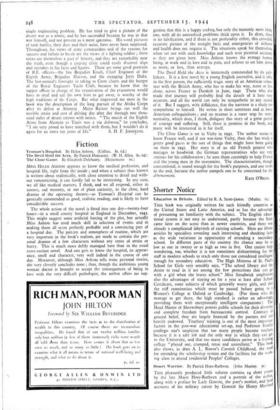Fiction
Yeoman's Hospital. By Helen Ashton. (Collins. 8s. 6d.)
Miss HELEN ASHTON appears to know the medical profession, and hospital life, right from the inside ; and when a subject thus known is written about realistically, with close attention to detail and with- out romanticising, it can hardly fail to be interesting. In any case, we all like medical matters, I think, and we all respond, either in uneasy, sad memory, or out of plain curiosity, to the close, hard dramas of the operating theatre—so Yeoman's Hospital can be generally commended as good, realistic reading, and is likely to have considerable success.
The whole action of the novel is fitted into one day—twenty-four hours—in a small county hospital in England in December, 1943. This might suggest some artificial forcing of the plot, but actually Miss Ashton has used much skill in selection of events and in making them all seem perfectly probable and a convincing part of a hospital day. The pattern and atmosphere of routine, which are very important in the book's realism, are made to contain the per- sonal dramas of a few characters without any sense of strain or hurry. This is much more deftly managed here than in the usual cross-section novel. And one gets to know the hospital, its appear- ance, smell and character, very well indeed in the course of one day. Moreover, although Miss Ashton tells some personal stories, she very cleverly concludes none ; thus, though the ambitious young woman doctor is brought to accept the consequences of being in love with the very difficult pathologist, the author offers no sug- gestion that this is a happy ending, but only the humanly most likely one, with all its unresolved problems thick upon it. In short, there is no falsification, and if there is not profundity either, this crowded, accurate picture of . the straight facts and emergencies of sickness and health does not require it. The situations speak for themselves, when set out with such knowledge and such neat pictorial accuracy as they are given here. Miss Ashton knows the average humap being, at work and in love and in pain, and refuses to set him down as more, or less, than average.
The Devil Held the Aces is immensely commended by its pub- lishers. It is a first novel by a young English journalist, and it tells, in the first person, the sufficiently tragic story of an American volun- teer with the British Army, who has to make his way, more or less alone, across France to Dunkirk in June, 1940 Those who also made that journey will probably find the details of it here very accurate, and all the world can only be sympathetic to any record of it. But I suggest, with diffidence, that the narrator is a shade too sympathetic to himself. He writes in short sentences and in loos: American colloquialisms ; and no manner is a surer trap foc senti- mentality, which does, I think, disfigure this story of a great period of courage and suffering. Still, there is promise in the book, and many will be interested in it for itself.
The Close Game is set in Vichy in 1942. The author seems to know France well, and if not war-time Vichy, then she has made pretty good guess at the sort of things that might have been going on there in 1942. Her story is of an old French general who manages to hoodwink the German representatives wbo are very anxious for his collaboration ; he uses them cunningly to help France and the young men in the mountains. The characterisation, though conventional, is sound enough for the book's purposes, and one reads to the end, because the author compels one to be concerned for the denouement. KATE O'BRIEN.






















 Previous page
Previous page